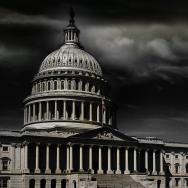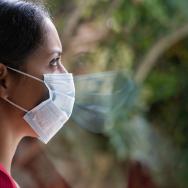When the coronavirus pandemic began this past spring, University of Chicago Law School scholars and students had already spent months battling Detroit’s electricity provider over a proposed rate increase. In the face of COVID-19, already pressing concerns about energy affordability suddenly took on a heightened urgency—and the Abrams Environmental Law Clinic quickly switched gears.
“We were advocating for low-income consumers, highlighting how these individuals already suffer from energy insecurity, and how utility bills are often a much larger percentage of their income,” said Clinical Prof. Mark Templeton, director of the Abrams Clinic. “And once COVID-19 hit, we talked about how the pandemic was adding some serious additional challenges.”
The Abrams Clinic first got involved in the case through their client Soulardarity, a Detroit-area nonprofit that advocates for affordable energy rates, equitable service and increased solar-powered energy in low-income neighborhoods. When southeastern Michigan energy company DTE proposed a rate increase before the Michigan Public Service Commission—which regulates investor-owned utilities—Soulardarity was one of many parties to oppose the move.
That opposition took on increased importance as the virus spread and stay-at-home orders took effect—and the Abrams Clinic began focusing on the ways in which higher electricity bills could create additional harms.
“A lot of people were laid off or furloughed because of the virus,” said Templeton, an expert on environmental law and energy policy. “As a result, they might not have the income to afford their energy bills. And for those people who are able to shift their work to home, they might be using more electricity, which would also significantly affect their budget.”
Lower-income neighborhoods are also more likely to experience power outages, dangerous downed power lines and other energy issues that create additional strain during a crisis like COVID-19, Templeton and his students said.
“If a family is already struggling with food insecurity, and their electricity shuts off and they lose everything in their freezer, that can be detrimental,” said Camille Sippel, a rising third-year student in the clinic who worked on the rate case. “Another example would be if someone is receiving at-home medical care, using a machine, and their electricity goes off—the last thing you want is to send an immunocompromised person to the hospital during a pandemic.”
In addition to the DTE rate case, the Michigan Public Service Commission opened a separate docket, seeking commentary on how utility companies might best respond during the COVID-19 crisis. The response from Soulardarity and other groups led to a binding order offering certain minimum protections—such as stopping shut-offs, ending late payment fees and ensuring that utilities could be easily restored.
“In the wake of COVID, Soulardarity wrote a letter as part of the rate case, prior to this new proceeding being opened, about how (these minimum protections) needed to happen,” said Olivia Cusimano, JD’20, who assisted with the initiative. “It was great to see that perhaps the Commission had listened to us. When they opened the new docket, we argued that this was a good first step, but certainly not the only step that they needed to be taking.”
The Abrams Clinic students working on the DTE rate case also raised additional concerns. For instance, DTE’s return on equity was so high that it enabled shareholders—many of whom live outside Michigan—to earn money at the expense of customers receiving more reliable service.
“Part of our argument was asking why the shareholders should be enriched when DTE is providing such poor service to low-income communities,” Cusimano said. “And ultimately, the administrative law judge and the Commission ended up approving a return on equity that was slightly lower than the approved return from last year.”
For Jackson Koeppel, Soulardarity’s co-founder and executive director, working with the Abrams Clinic has helped the organization translate their values and goals into legal frameworks that can have a real impact.
“Having the clinic represent us—and having the capacity to be on the ground on the community side, and deeply engaged on the legal side—has allowed us to bridge that gap,” said Koeppel. “It’s been really impactful to have them work with us and support us, and help us realize our goals from the community side in these legalistic processes.”
The relationship that Soulardarity and the Abrams Clinic have developed over the years has been critical during the pandemic. Students and faculty were able to respond quickly amid the COVID-19 crisis, helping the organization voice its concerns in formal legal proceedings—from drafting letters to keeping track of crucial information.
“Because there’s this collaborative relationship where they know what we want and they know what our goals are,” Koeppel said, “they can really help to do those quick turnaround things, and keep us in a process that otherwise—just capacity-wise—we would be falling out of.”
Even before the pandemic, students in the Abrams Clinic had represented Soulardarity in five separate legal proceedings aimed at fighting for equitable energy in Detroit. Asst. Clinical Prof. Robert Weinstock, who teaches with Templeton in the Abrams Clinic, said these types of opportunities are especially valuable during law school.
“This project has brought together two of the most important social issues that we're facing right now,” Weinstock said. “It’s dealing with the pandemic, and it’s dealing with social justice. Students are incredibly interested in these issues, and they want to make a difference. Doing this work shows them how, through law, they really can make a difference.”
Projects like these also demonstrate the wide range of issues environmental law clinics can take on, Templeton added, and the impact their work can have.
“All of this work—whether it’s related to COVID-19 or not—is very untraditional for environmental law clinics,” Templeton said. “In a sense, this is another step in the reconceptualization of what a traditional environmental law clinic is.
“We're talking about environmental justice, we’re talking about energy democracy and we're talking about the pandemic. I think it just shows the evolution of environmental practices. It's a very different idea from what environmental law clinics have been doing traditionally and is a significant new way for us to have meaningful impact.”
—A version of this story was first published by the University of Chicago Law School.

